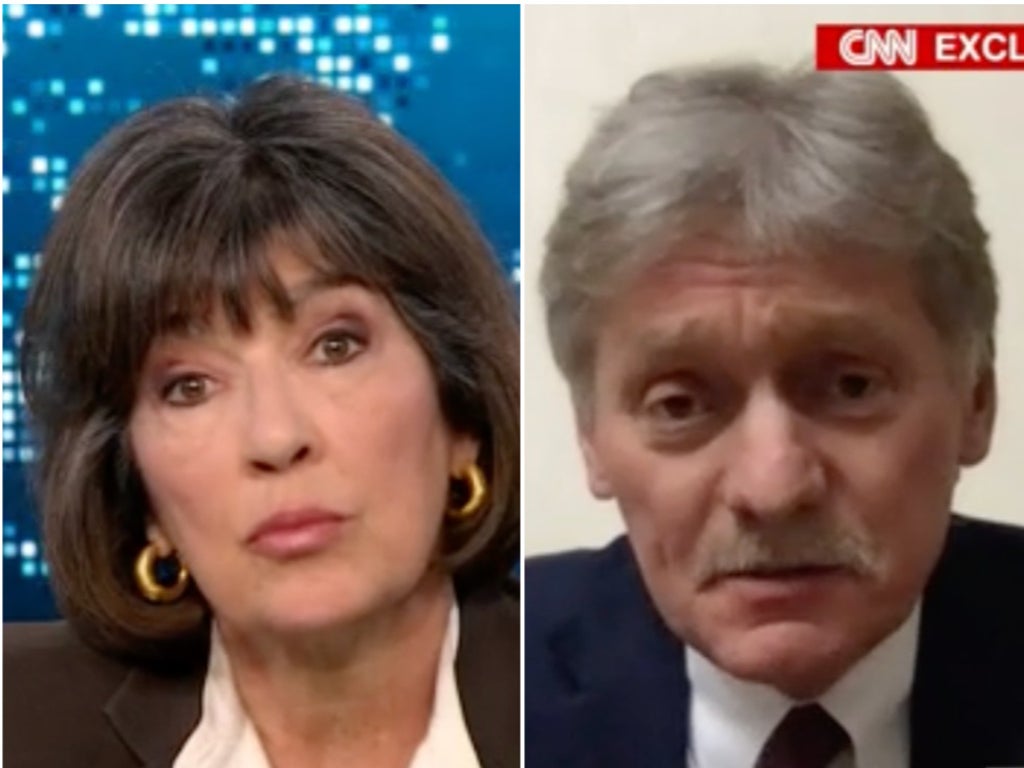
Veteran broadcaster Christiane Amanpour challenged Kremlin spokesperson Dmitry Peskov about the resentencing of opposition leader Alexei Navalny and the reaction of the Russian authorities to dissent regarding the war in Ukraine.
CNN’s chief international anchor bluntly asked him: “What are you so afraid of?”
Amanpour began: “Alexei Navalny has been sentenced, I believe, to nine years in maximum security. People on the streets of Russia have been hoovered up and detained somewhere in the region of, according to the CIA, some 14,000 to 15,000 Russians. You have prevented independent news organisations from calling it a war, from describing anything about it other than the defence ministry line and the Kremlin line.”
She continued: “My question is, what are you so afraid of? Of Navalny, of journalists, of the truth? What is there to fear?”
Mr Peskov gave a somewhat subdued response focussing on Mr Navalny’s new sentencing. The Kremlin critic is already serving a two-and-a-half-year sentence in a prison colony east of Moscow for parole violations.
“No. Well, Navalny. Navalny is a prisoner. He’s a prisoner. He had his… his first sentence. Now he’s … he’s got his second one and he’s blamed. And then it is proven by the prosecutor’s office that he’s blamed for fraud. So it’s … it’s a purely economical crime,” said Mr Peskov, ignoring the persecution and poisoning of Mr Navalny that preceded his current imprisonment.
Follow the latest updates on the war in Ukraine
“He was collecting money by his foundation from citizens, regular citizens of Russia, and also from abroad, and he was spending part of that money for his personal purposes. This is a fraud in our country,” he continued. “And he was supposed to be punished. And no one is afraid of him. It’s … it’s if [someone] is a criminal, he should be in prison. This is the same thing that is happening in the United States and in European countries.”
Amanpour replied: “I know you say that. I know the prosecution says that. But the people who allegedly claimed that he was taking their money and using it for himself then said on the stand that they had been forced … to make those testimonies.”
One of Russia’s most prominent opposition figures, Mr Navalny was accused of stealing $4.7m (£3.5m) of donations received by his now-banned political organisations. He pleaded not guilty.
State prosecutors had asked the court to move him from a jail in east Moscow to a maximum security facility for 13 years on charges of fraud and contempt of court.
Campaigners and supporters of Mr Navalny, an anti-corruption campaigner and a long-time foe of Russian President Vladimir Putin, have described the trial as a “sham”.
Authorities have cast Mr Navalny and his supporters as subversives, asserting that he is determined to destabilise Russia with backing from the west.
Many of his allies have fled Russia rather than face restrictions or jail in their home country.
While this opposition movement has been labelled “extremist” and shut down, Mr Navalny’s supporters continue to express their political opinions online, including their opposition to Moscow’s war in Ukraine.
Protests against the conflict have broken out in major cities across Russia, and earlier this month Mr Navalny called for people to take to the streets.
“I call on everyone to take to the streets and fight for peace,” his spokesperson wrote on Twitter at the time.
“We – Russia – want to be a nation of peace. Alas, few people would call us that now,” the message continued.
“Let’s at least not become a nation of frightened silent people. Of cowards who pretend not to notice the aggressive war against Ukraine unleashed by our obviously insane czar.”
Russian authorities have arrested thousands of people who participated in demonstrations against the war.
At other points in the interview with Amanpour, Mr Peskov conceded that Russia has yet to achieve any of its military goals in Ukraine — referring to the invasion as a “special military operation” — and refused to rule out Moscow resorting to the use of nuclear weapons in the conflict.
When asked under what conditions Mr Putin might use Russia’s nuclear capability, Mr Peskov replied: “If it is an existential threat for our country, then it can be.”







